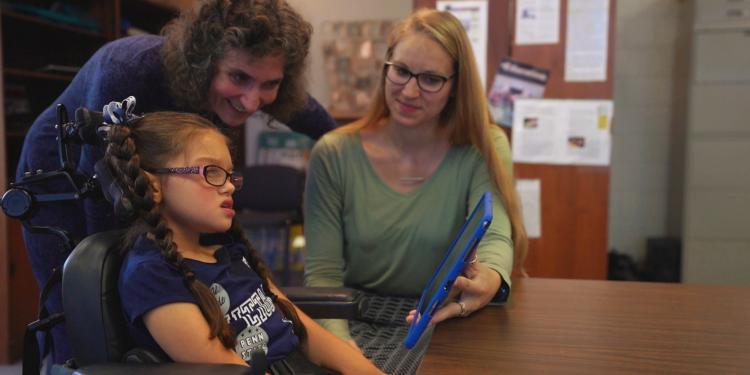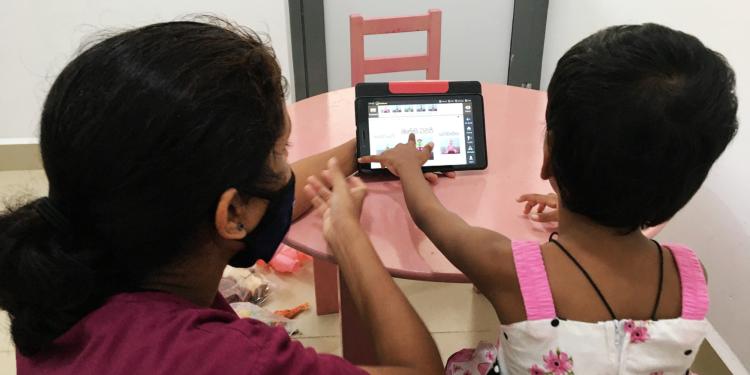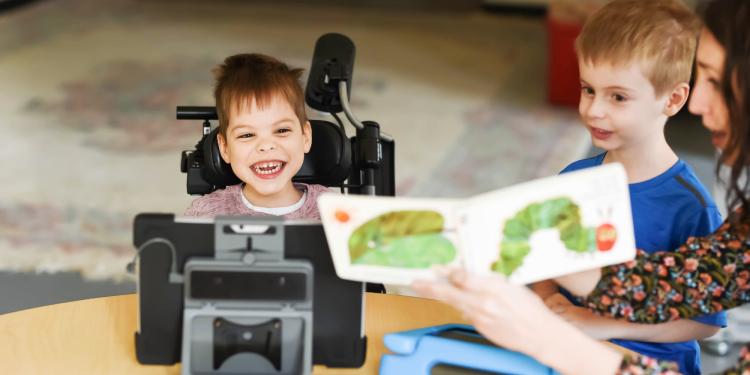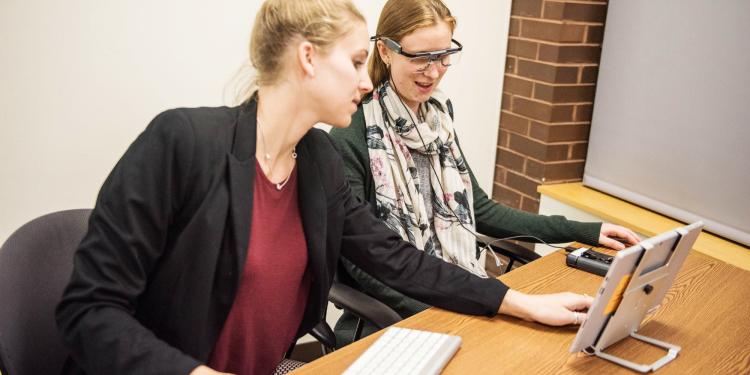Research in Augmentative and Alternative Communication
World-leaders in Augmentative and Alternative Communication
The Penn State program in augmentative and alternative communication (AAC) works to advance knowledge and improve outcomes for individuals who require AAC. Projects range from basic research to clinical evaluation to implementation science.
Research is published in high-quality, peer-reviewed journals and presented at state, national and international conferences to promote the translation of research to practice.

Augmentative and Alternative Communication (AAC) Laboratory
Principal Investigator: Janice Light, Ph.D.
AAC at Penn State | Facebook | Twitter
The RERC on AAC | Facebook | Twitter | Instagram
Studying AAC interventions and technologies to enhance the language development, literacy learning, and communicative competence of individuals with complex communication needs
The AAC lab supports a wide array of activities to improve outcomes for the estimated 5 million Americans, 97 million people worldwide, who have such complex disabilities that they cannot rely on conventional channels of spoken and written communication.
We conduct: research to advance knowledge; development to improve AAC assistive technologies; training to build capacity in the field; and dissemination to support the translation of research to evidence-based practice. Our mission is to enhance communication, increase participation, and improve quality of life for individuals with complex communication needs including children and adults with developmental disabilities (e.g., autism spectrum disorder, cerebral palsy, Down syndrome, etc.), acquired conditions (e.g., traumatic brain injury, spinal cord injury, stroke, etc.), degenerative conditions (e.g., ALS, muscular dystrophy, dementia), and temporary conditions (e.g., those who are intubated due to COVID).
Our work is supported by a wide range of externally funded research and training grants. We are the lead agency for the federally funded Rehabilitation Engineering Research Center on Augmentative and Alternative Communication (The RERC on AAC), a national center for AAC research, development, training, and dissemination.

Augmentative and Alternative Communication (AAC) and Developmental Disabilities Laboratory
Principal Investigator: Kathryn D. R. Drager, Ph.D., CCC-SLP
Studying AAC, Autism, Intervention with Individuals with Severe Disabilities, Low-Resource Communities and Contexts
This lab houses projects that seek to improve the lives of individuals with disabilities of all ages, with an emphasis on school-age children, adolescents, and adults with developmental disabilities, including autism. A particular focus is on daily experiences of individuals and families, and on interventions that can be implemented within daily life.
Studies in this laboratory also examine applications for people within low-resource communities, where technological solutions may not be readily available, including in low- and middle-income countries. The lab is equipped with digital audio and video recording and editing capability.

Augmentative and Alternative Communication (AAC) and Literacy Lab
Principal Investigator: Jessica Caron, Ph.D., CCC-SLP
Studying AAC, Literacy, Training Supports, and Implementation Science
This lab houses state of the art AAC technology designed to support individuals with complex communication needs. Video equipment and computers are also available and equipped for analyzing and editing video. Testing instruments for assessing language, communication, and literacy is also available.
Research in the laboratory focuses on improving communication and literacy outcomes for individuals with a range of disabilities, including children, adolescents, and adults.
Specifically, the ongoing research projects in this laboratory are investigating implementation science variables related to the: (a) development of evidence-based literacy practices for individuals who use AAC, (b) knowledge transfer and training of evidence-based practices to relevant stakeholders, and (c) variables that support sustained and larger-scale implementation of adapted literacy instruction for individuals who have limited or no speech.

Laboratory for the Study of Visual Supports in Communication and Education
Principal Investigator: Krista Wilkinson, Ph.D.
Studying communication/language in developmental and intellectual disabilities, visual-perceptual processes, eyetracking
This lab seeks to improve the effectiveness of visual supports used in communication intervention for individuals with developmental and intellectual disabilities. Many such children use visual schedules, calendars, or communication books that have pictures of upcoming activities, desired foods, friends, or favorite social activities. The studies in this laboratory examine how systematic consideration of the construction of these displays (placement and color of the symbols on the aid, for instance) might influence functional communication or learning outcomes. The research includes basic studies of visual processing conducted within the laboratory as well as applied instructional procedures embedded within storybook reading activities that take place in children’s homes or schools. Future planned studies include neuro-imaging studies that will allow us to examine brain responses to the visual communication symbols presented on the displays.



